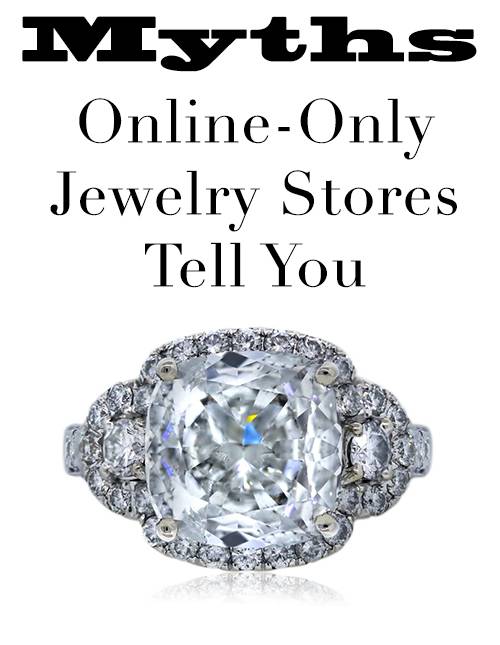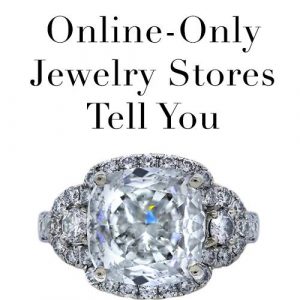Myths Online Jewelers Will Tell You

Welcome back, readers! Today, our GIA Graduate Gemologist, Richard Resnik, is sharing his thoughts on the misinformation game some jewelry retailers play. Because we’re both a brick & mortar jewelry store and one of the nation’s largest online jewelry retailers, we’re in a unique position of seeing the pro’s and con’s of each side of the business. At the end of the day, it comes down to the customer’s shopping preference, and our overall goal is to educate and please our customers – no matter which shopping experience they choose.
Today consumers have many options when it comes to purchasing a diamond or piece of jewelry. It can be a daunting task for the average consumer. It is important when choosing a jeweler or even an online retailer that you choose based on more than just price. Recently an online only retailer put out information that shed a negative light on brick and mortar stores, claiming local jewelers are out to scare customers into working with them, rather than giving a fair explanation of the difference between online and brick & mortar retailers.. They go so far as to make up “Myths” that they claim local jewelers will tell you to dissuade you from shopping locally. This article will tell you both the myths local jewelers are claiming and why you should take their statements with a grain of salt. The following are 7 myths that they say that local jewelers will tell you.
“Certification is Not Necessary”
Online retailers will tell you to not choose a diamond that has not been certified. While a certificate from a reputable lab such as GIA is preferable, as they are the most reputable of all diamond laboratories, diamonds that are certified carry a higher price per carat and you may find a good value in a stone that is not certified. However if you are working with an online only retailer, you cannot be provided with the experience of seeing both stones side by side to really see a comparison or get a fair and accurate explanation of the differences between them. Online only retailers count on this fact that you cannot compare side by side and are more likely choose one of the ones they are offering. In addition by using only certified gemstones they eliminate the need have highly skilled Gemologists on staff. They rely on the certificates to provide their customers with the only information available and providing limited education for their customers. Online only retailers will characterize jewelers that offer uncertified stones as “unscrupulous” rather than backing up their statements.
“Buying Loose Diamonds Online is Unsafe”
Online jewelers make the claim that local jewelers will state that buying a loose diamond online is unsafe. They claim that the reason for this is that the inventory of traditional stores inventory appears to be smaller when compared to their online counterparts. What the online retailer does not want their customers to know is that they really do not have the extensive inventory the consumer is led to believe. Online jewelers price and publish a list of inventory they are able to get from their suppliers and mark them up accordingly. Since the diamond is not in their possession at the time of sale there is no guarantee they will be able to deliver what the customer wants and possibly run into a problem if 2 clients were to order the same diamond simultaneously or their supplier sells the diamond to someone else.
Online or in-store reputation is key. Like any other purchase, you do need to investigate the seller and the company to ensure they have a good reputation. Consider the history of the company, how many years of experience, testimonials and referrals from friends and family as well memberships to business associations such as the Better Business Bureau.
“Online Diamond Retailers Can’t Compete on Service”
Online retailers state that “underhanded” local retailers will tell you that shopping online and comparing prices from home is impersonal. Most people would agree, it is. Certainly one could go on any site, visit it and make any purchases without speaking to anyone but many people like the ability to discuss their options with a sales associate or jeweler before purchasing.
Not every online retailer offers live customer service and if they do not everyone on the other end is trained with the skills necessary to assist you in what you need. If you are looking for custom design then you need to be able to verbally communicate your ideas or be able to send scans and emails of designs back and forth. If the online retailer is unable to provide that then you may not get the exact item you want. Also if you come to the store in person you may see something similar that would be a great jumping off point for custom work. If you see a ring with the approximate size and weight then the jeweler will have a way to gauge. Talking to someone over the phone or in person gives you immediate answers to any questions you may have and your buying experience will be more personal.
“You Have to Set Aside at Least Three Months of Your Salary For a Good Diamond”
First off, this is not a myth created by local jewelers. It started out as a marketing campaign by DeBeers, the world’s largest supplier of diamonds. “How else could two-months’ salary last forever?”, (somehow that evolved into three months). While it is a common thought process and guideline when considering making your purchase it is by no means a “rule” and in today’s society there are no standards in determining how much a client should spend. Online retailers want you to think that the source of line of reasoning is from “untrustworthy jewelers.” This simply is not true. Any reputable jeweler should be willing to provide their client with the best piece of jewelry within their budget. That’s simply good customer service.
“White Gold is Stronger Than Platinum”
Both have their pros and cons and any reputable jeweler should be able to explain the benefits or drawbacks of both. White gold in either 14K or 18K is less pure than platinum, less dense and not pure white so it needs to be plated in Rhodium periodically. When you plate white gold the ring needs to be polished first which over time can wear down the amount of metal in the ring.
Platinum is a very dense precious metal that is strong and durable. However platinum does scratch very easily and can get dull. That being said, its high density allows for polishing without worry of losing thickness for many years. Platinum’s strength does protect the diamond better than white gold in the long term but for a client who is on a budget 14K white gold is a better choice than 18K since is it is more durable of the two.
“Diamonds Are Indestructible”
Diamonds register a 10 on the Mohs scale of mineral hardness, so they don’t scratch easily. However they are not very tough, meaning hit it with a hammer and you are sure to destroy it. You need to make sure you work with a jeweler that can handle your diamond with the utmost respect and treat them delicately.
Online retailers cannot properly service your jewelry better than a trusted local jeweler. For starters they cannot perform the repair in front of you if necessary. There are horror stories based on mistrust that accuse the online retailer of replacing a diamond with a lower quality stone or a simulant. Even more worrisome, an online retailer may faultyour local jeweler for damage or accuse them of stone swapping.Additionally It can be costly to insure an item to send back to them for repair.
“Different Diamond Certification Agencies Grade the Same Way”
If you have read this far then you have already read the portion where I explain the difference between a certified diamond versus uncertified. There are many gemological laboratories out there and by no means do they all have the same standards. In some cases their standards are even more relaxed and are not accepted by reputable jewelers. In fact, in our store some of these labs are not even considered as such. Even if it has a certificate from a so-called laboratory, it’s not a certified stone. With the exception of GIA, all other gem labs are for-profit laboratories and make their money by producing the certificate for the retailer or diamond supplier. Most have guarantees for their customer that if it does not meet the client’s requirements then the certificate isn’t issued and the client does not pay. In this case their workers are ready to be more lenient or let a stone “squeak by” in order to increase their productivity. As such some certifications are not necessarily better than having no certificate at all – but the customer might still pay more to have a “certified” stone. In fact working with a reputable and trusted jeweler can be better for you than having a certificate from some of these laboratories.
Certain online jewelers make claims that your local jeweler is out to mislead the customer just to get their business. And while I admit there are unfortunately a few bad apples out there by no means should be a reason for a customer to reach out to an online only retailer who makes claims that your local jeweler is “out to get you”. As a consumer it is your right and prerogative to do as much research as you possibly can so that you can make an informed decision. In the end you should feel comfortable with whomever you work with and can provide you with the long-term customer service that you should expect from your local jeweler.


